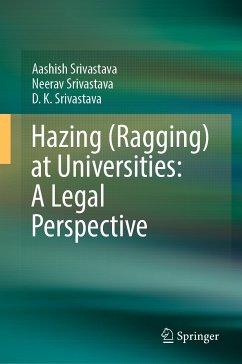This is the first socio-legal multi-jurisdictional study on hazing (ragging). This book considers four countries: the USA, India, Sri Lanka, and Australia. It states the legal position, identifies lacunas in law, and proposes possible legal solutions. Unfortunately, laws, regulations, and policies have failed to stamp out hazing from university campuses and residential colleges.
Hazing has spiralled out of control in a number of countries. It has descended into a cruel, barbaric, and inhuman practice. The number of students subjected to hazing and sexual abuse is alarming. According to a 2022 survey, more than half (53%) of American students who were part of a fraternity or sorority experienced hazing. Students are murdered, harmed, abused, and suffer long-term trauma. The prevention of hazing is one of the most important responsibilities of 21st century universities.
The theme of the book is that universities are in the best position to protect students from hazing and must play a vital role. As a sociological study, the book also considers why hazing occurs and what can be done to prevent it. Without engaging with the underlying causes, legal punitive measures continue to address the symptom rather than the cause. The book, therefore, explores how a more innovative approach to regulation can help tackle the cause.
The book will be of interest to policy makers, regulators at universities, education and legal academics, and personal injury lawyers.
Hazing has spiralled out of control in a number of countries. It has descended into a cruel, barbaric, and inhuman practice. The number of students subjected to hazing and sexual abuse is alarming. According to a 2022 survey, more than half (53%) of American students who were part of a fraternity or sorority experienced hazing. Students are murdered, harmed, abused, and suffer long-term trauma. The prevention of hazing is one of the most important responsibilities of 21st century universities.
The theme of the book is that universities are in the best position to protect students from hazing and must play a vital role. As a sociological study, the book also considers why hazing occurs and what can be done to prevent it. Without engaging with the underlying causes, legal punitive measures continue to address the symptom rather than the cause. The book, therefore, explores how a more innovative approach to regulation can help tackle the cause.
The book will be of interest to policy makers, regulators at universities, education and legal academics, and personal injury lawyers.
Dieser Download kann aus rechtlichen Gründen nur mit Rechnungsadresse in A, B, BG, CY, CZ, D, DK, EW, E, FIN, F, GR, HR, H, IRL, I, LT, L, LR, M, NL, PL, P, R, S, SLO, SK ausgeliefert werden.
Es gelten unsere Allgemeinen Geschäftsbedingungen: www.buecher.de/agb
Impressum
www.buecher.de ist ein Internetauftritt der buecher.de internetstores GmbH
Geschäftsführung: Monica Sawhney | Roland Kölbl | Günter Hilger
Sitz der Gesellschaft: Batheyer Straße 115 - 117, 58099 Hagen
Postanschrift: Bürgermeister-Wegele-Str. 12, 86167 Augsburg
Amtsgericht Hagen HRB 13257
Steuernummer: 321/5800/1497
USt-IdNr: DE450055826
Bitte wählen Sie Ihr Anliegen aus.
Rechnungen
Retourenschein anfordern
Bestellstatus
Storno









